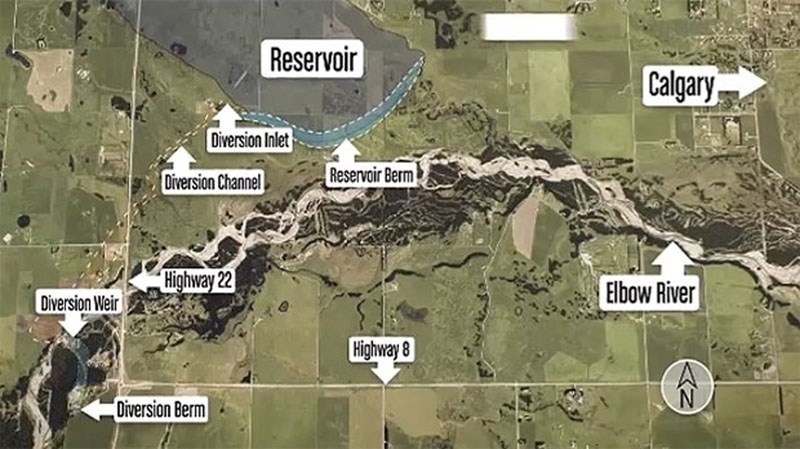The Government of Alberta is investigating the potential environmental effects of the much-maligned Springbank Off-Stream Reservoir (SR1). The SR1 was initially proposed after the 2013 flood that devastated the Calgary area.
The Government of Alberta is investigating the potential environmental effects of the much-maligned Springbank Off-Stream Reservoir (SR1).
The SR1 was initially proposed after the 2013 flood that devastated the Calgary area. Located 14 km west of Calgary, the SR1 is a proposed concrete dam and the project would span approximately 3,475 acres.
“It's clear residents of Calgary and others on the Elbow River need protection from floods. The Springbank Off-stream Reservoir was first proposed in April 2014 because of the potential to store a significant volume of flood water off-stream, along the Elbow River, upstream of Calgary, ” said Aileen Machell, press secretary to minister of transportation and minister of infrastructure.
But not everyone is in favour of this form of flood mitigation. Some people in the Springbank area are concerned about the size of the project and the impact it will have.
“Our position is that the decision to put the flood mitigation dam in Springbank is the wrong one for Alberta and that the choice of McLean Creek is much better, ” said Ryan Robinson, spokesperson for the Don't Damn Springbank Organization.
The organization started as a group of concerned residents, businesses, and organizations. According to its website, its mission is to motivate the Government of Alberta to pursue more effective, natural, and environmentally responsible flood mitigation projects without destructive impacts to any community.
Up to this point in time, the government has held multiple meetings with landowners and four public consultation events in the winter and spring of 2015.
People involved with the Don't Damn Springbank Organization have decided to allow access to their lands in order to complete the yearlong environmental assessment, which will wrap up in spring of 2017.
Robinson said the organization decided to allow the government access to conduct the environmental assessment to prevent it from forcing its way onto private land. Members are also hopeful the assessment will determine the project is not actually feasible.
“We are sure that the more studies that get done on this, and the more the footprint of the project keeps growing, it will become obvious that the scale of it has gotten so big it will be unaffordable, ” Robinson explained.
He also said by allowing land access, it gives the landowners some control in the project because they can see when the land is being accessed and what is being done on it.
“We intend to continue to fight the project. There has been zero discussions about land transfer or land sale, ” Robinson said.
Rocky View County has no official position on the SR1 but has made numerous requests to the government for information and consultation on the project.
“To date we have not received suitable documentation to consider and comment on, ” states a letter addressed to Alberta Premier Rachel Notley dated March 1.
According to Machell, Alberta Transportation will contact the county in coming weeks to line up a meeting. A benefit-cost analysis was completed for all three proposed major mitigation projects along the Elbow River, which is available online.
While the objective of the Don't Damn Springbank Organization is to stop SR1, it is in favour of flood mitigation in other areas. The group argues that “an upstream dam in McLean Creek would give Calgary the same level of protection and protect Bragg Creek, Redwood Meadows, Tsuu T'ina Nation, and Springbank as well. ”
Robinson also claims the McLean Creek Dam would be more suitable as it would use public land as opposed to the SR1 which would be on privately-owned land. Machell said McLean Creek Dam “was strongly considered. ”
“Experts, including the highly-respected Dutch research foundation Deltares, recommended this plan because it will provide the best protection, at the best value for taxpayers, with lower construction risk, while limiting adverse environmental impacts, ” Machell said.
